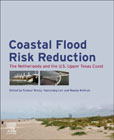
Coastal Flood Risk Reduction: The Netherlands and the US Upper Texas Coast
Brody, Samuel
Lee, Yoonjeong
Kothuis, Baukje
Coastal Flood Risk Reduction: The Netherlands and the US Upper Texas Coast represents the culmination of a 5-year international research and education partnership funded by the US National Science Foundation (NSF) and more than 10 years of collaboration between Dutch and US flood experts on the basic issue of how to protect society from growing flood risks. Multiple case studies integrating the fields of engineering, hydrology, landscape architecture, economics, and planning address the underlying characteristics of physical flood risks and their prediction; human communities and the associated built environment; physical, social, and built-environment variables; and mitigation techniques. In recognition of the lack of systematic research and the growing societal need to better understand flood impacts, this edited book provides an in-depth, comparative evaluation of flood problems and solutions in two key places: the Netherlands and the US Upper Texas Coast. Both regions are extremely flood-prone and have experienced continual adverse impacts throughout their histories. For researchers in flood management, geographers, hydrologists, environmental studies, and social science as well as policymakers and decision-makers in flood management authorities and related industries, this book provides an essential resource. Introduces integrated comparative work on flood risk reduction and management across disciplines and international boundaries Presents chapters written by dozens of experts across six U.S. and Dutch universities that have formally participated in the international research and education program funded by the U.S. National Science Foundation (NSF) Provides a basis for understanding and mitigating flood risk over a range of necessary perspectives, from modeling inputs to design solutions Integrates cutting-edge scientific methods and state-of-the-art knowledge with examples of specific solutions and how they are being implemented in each national case study INDICE: 1. Coastal Flood Risk Reduction Program2. Setting the Stage -Tulips and Tacos3. Storm Surge Modeling in the Gulf of Mexico and Houston-Galveston Region4. Modeling movement of water and sand (sediment transport) in coastal environments5. Inland (pluvial) and urban flood prediction6. Using machine learning to predict flood hazards based on previous losses7. Compound flooding8. Cost/benefit analysis to calculate residential and industrial impacts in TX9. The Role of Insurance in Facilitating Economic Recovery from Floods10. Behavioral insights into the causes of underinsurance against flood risks: Experimental evidence from the Netherlands11. Calculating economic risk, safety standards and decision making12. Infrastructure impacts and vulnerability to coastal flood events13. Understanding the impacts of development patterns and the built environment on flood loss14. Plan evaluation for flood resilient communities: The Plan Integration for Resilience Scorecard15. Dreaming about Houston and Rotterdam beyond oil and ship channel16. A new nature-based approach for flood proofing the Metropolitan Region Amsterdam17. Green Infrastructure-based Design in Texas Coastal Communities18. Integrated urban design in the U.S.A. and the Netherlands19. Flood risk reduction for Galveston Bay: preliminary design of a coastal barrier20. Design, maintain and operate movable storm surge barriers for flood risk reduction21. Designing and implementing coastal dunes for flood risk reduction22. Evaluating the Economic Benefits of Proactive Property Acquisition in Coastal Communities. Case of the Houston- Galveston Region23. Wetlands as an Ecological Function for Flood Reduction24. Designing and building Flood-proof houses25. Risk Communication Tools: Bridging the gap between knowledge and action for flood risk reduction.26. How to design a successful international integrative research and education program27. The effects of place-and-problem-based research education: the student survey28. A specific cross-disciplinary Building with Nature workshop-model to teach a multi-perspective problem approach for integrated design29. Flood risk assessment of storage tanks in the Port of Rotterdam - a multi-faceted learning experience30. Detailing experiences on place-based learning and research outcomes from a student perspective.31. Conclusions and synthesis
- ISBN: 978-0-323-85251-7
- Editorial: Elsevier
- Encuadernacion: Rústica
- Páginas: 350
- Fecha Publicación: 01/05/2022
- Nº Volúmenes: 1
- Idioma: Inglés
